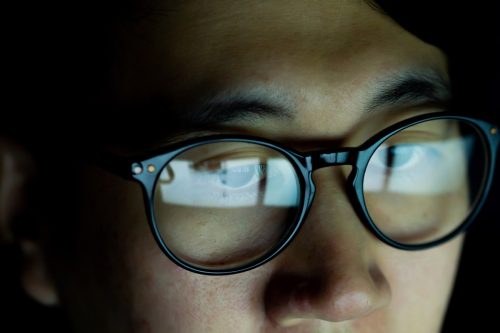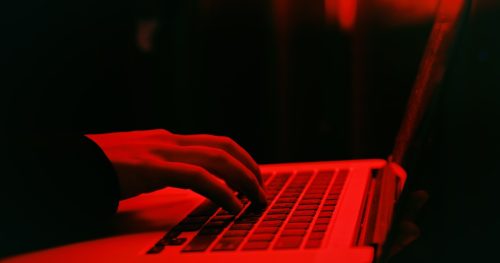What Is the Dark Web, and Is It Safe to Use?

The name doesn’t exactly help, but the dark web has a reputation of being, well, a pretty dark place—filled with criminals and illegal products you definitely won’t find on Amazon. The internet can be scary enough as is, but it’s also a seemingly endless source of useful information. And the dark web goes well beyond what you’d find through typical browsing. With that in mind, it’s not something you should tinker with lightly, so before diving in, let’s first understand what it is and the best tips to safeguard yourself against threats.
We’ve connected with several cyber security experts to give you an informed breakdown. Ready to get started? Read on for their most essential tips and guidance.
RELATED: 5 Ways to Protect Your Facebook From Hackers.
What is the dark web?

According to every spy movie ever, the dark web is a very off-the-books, dangerous, hard-to-hack part of the internet that is the key to every top-secret mission. In reality, the dark web is more than the stuff of spy flicks: It’s a real space where none of the pages are indexed by search engines.
It also offers access to information and items that aren’t available on the regular web. The dark web is the other side of the internet, but while it’s filled with hidden internet sites, it works much like the regular internet. A key difference is that it offers both legal and illegal content via online marketplaces and forums.
The dark web “includes things like the authenticated functionality on your bank’s website, as well as Telegram channels and the TOR network,” says Josh Amishav, founder and CEO of Breachsense.
This collection of websites usually uses certain software or encryptions, which makes it extra challenging if not impossible to track your internet activity. That keeps users essentially anonymous and private.
Is the dark web only for criminals?

The dark web is not a playground, but it’s not just an exclusive club for cybercriminals eihter.
“Often a common misconception, the dark web is not illegal, and it is not unlawful to access it,” Zulfikar Ramzan, a chief scientist at Aura, says. “However, most of the activities that take place on the dark web are illegal and related to criminal actions.”
Brittany Allen, a fraud prevention expert, explains that the dark web is built to keep users anonymous, which is an attractive feature for people who may be looking to commit fraud. But the dark web does have other legitimate purposes, too, Amishav explains.
“Folks living under oppressive governments or strict censorship laws can use things like the TOR browser to access information anonymously,” he says. “Even folks in Western societies, like journalists and whistleblowers, often rely on the dark web as well to communicate securely and anonymously.”
RELATED: 10 Tech Tips for Seniors: How to Master Your Devices.
What can you find on the dark web?

It’s important to note, “Not everything on the dark web is illegal, but due to the lack of regulation, it can be a dangerous place,” says Calum Baird, a digital forensics and incident response consultant.
You can find all types of things for sale, including different forms of identification like passports and social security numbers, as well as banking details, social media logins, illegal drugs, credit card information, weapons, and illegal pornography, to name a few.
However, according to Norton, an antivirus and anti-malware software company, there are also legal and less illicit items you can find on the dark web, such as memorabilia, wellness products, collectibles, and artisanal goods.
Are there any benefits to using the dark web?
According to Norton, although the dark web can feel a lot like the Wild West, there are several positive uses for it:
- Free academic research: The dark web offers just about everything, including unrestricted access to free research publications. (You’re welcome, grad students!)
- Secure user experience: If you’re not a fan of Big Brother always watching your search history and then targeting ads based on your internet activity, the dark web offers a private and secure search experience that is ad-free and doesn’t include tracking. This also applies to social media, which you can use without worrying about anything being tracked.
- Access to geo-blocked sites: If a site is blocked due to censorship or for other reasons, you can find it unrestricted using the dark web.
- Cryptocurrency security: If you’re into cryptocurrency, the dark web is considered a safe place to use your digital wallet.
RELATED: What Does a Credit Card Skimmer Look Like? 7 Ways to Spot One
Should I use the dark web?

Now that you know what the dark web is, you may be wondering if it’s something you should add to your search experience. According Ramzan, the people who would find the dark web most beneficial to their goals include:
- Whistleblowers
- Activists
- Dissidents of oppressive regimes and people living in countries with restrictive internet access
- Journalists looking to protect their sources
- Law enforcement
- Intelligence agencies
Navigating this space is not only risky, but also likely unnecessary if you don’t fall into any of these categories. For the average person, the dark web isn’t something you should engage with casually.
According to Josh Smith, principal threat analyst for Nuspire, it “brings more risk to the user than any gain they will get from it. Regardless, if someone decides to explore it, understand that you may encounter illegal activities.”
Because of the dark web’s anonymous user structure and lack of regulation, “the dark web can be a risky place for the average internet user because of the higher likelihood of encountering scams, malware, or illegal content,” says Allen.
How do I safely use the dark web?

With the right knowledge, you can navigate the dark web safely.
First, it’s important to arm yourself with network tools like the TOR browser (The Onion Router), which was first developed by the U.S. Naval Research Lab.
TOR helps protect your search by not routing traffic from your device to the web. Using encrypted servers or decentralized nodes, it allows users and their sites to be anonymous.
“The TOR Browser is currently available only for Windows, Mac, Android, and Linux,” says Ramzan. “Once connected, you’ll have access to darknet websites called ‘TOR hidden services.’ Instead of ‘.com’ or ‘.org,’ Dark Web addresses trail with a ‘.onion.'”
Use a VPN, which stands for virtual private network. It allows you to establish a digital connection with a remote server owned by the VPN provider. All the information you engage with on the internet is then encrypted, hiding your IP address. This keeps cyber snoopers from using any of the data or information you share or get.
To avoid plugging long dark web URLs into your browsers, you should use dark web search engines for a more streamlined approach. Here are a few popular engines:
- Ahmia.fi: Users can access links to the dark web using browsers they’re used to, like Chrome or Firefox. Keep in mind that to use those sites, you’ll need to use Ahmia.fi through the TOR browser.
- DuckDuckGo: This search engine is the default search engine for the TOR. Users can access the dark web untracked and anonymously.
- Torch: Torch looks a lot like Google’s home screen, so it has a familiar feel that makes it easier to navigate.
“It should go without saying, but do not participate in anything illegal,” Smith cautions. “Additionally, malware and scams are found frequently. Avoid downloading anything from the dark web, which could contain malware or illegal content. Don’t click links because they also could lead you to illegal content.”
RELATED: 7 Sneaky Ways You’re Slowing Down Your Internet, Experts Say.
What threats are on the darkweb?

There’s a lot you should be aware of before you start using the dark web. Baird suggests keeping the following dangers in mind:
- Strange links: Stay away from suspicious links. If you click on one, you could infect your computer with malware designed to damage it. It’s best not to engage with any links you’re not familiar with, as you run the risk of unleashing a nasty virus onto your device.
- Psychologically distressing content: The internet can be a weird place, but the dark web can expose you to things that can rock you to your core. You may want to stay off the dark web if you don’t want to see anything that could be emotionally damaging.
- Scams: The internet is rife with scams and dishonesty, so on the dark web, you are bound to run into “sellers failing to follow through after payment is sent,” Baird warns. Try your best to connect with reputable sellers.
- Illegal content: You will be charged if you commit illegal acts on the dark web, full stop. The dark web, although built to keep people’s internet usage anonymous and private, doesn’t shield you from being caught and prosecuted.
- Sites that ask for your personal details: Hackers are foaming at the mouth for your private information, and sometimes, they’re hard to detect. To be safe, never share anything you don’t want to risk being stolen.
- Webcam hijacking: According to Norton, this occurs when a website on the dark web adds a remote administration tool to your computer. “That can let them hijack your webcam and spy on you through your device’s camera lens,” the site reads.
Who controls the dark web?

When we think about who controls the dark web, it’s easy to imagine a cloaked figure hiding behind a brightly lit laptop screen. However, “No entity controls the dark web, as each site has its own individual operators,” Smith explains.
The dark web is completely unregulated and doesn’t belong to one person, but rather a network of people who run proxy servers through it.
How do I find out if my information is on the dark web?

You can discover if your information is on the dark web by signing up for a dark web monitoring service or scanning tool. Having a tool like this can help you effectively check where your information is, and if there’s been a data breach.
“When data is stolen from a website/platform and published on the dark web, some of your info may then be on the dark web; however, the risk and extent of this will vary,” Baird says.
So if you do find that your information is on the dark web, keep in mind that “some datasets will contain information which, alone, is not hugely concerning [like] email addresses [while] some may contain … name, address, date of birth, social security number … which could be used for fraud,” Baird explains. “Some may contain data that threat actors may use to target you! For example, if they are aware of your name, addresses, phone number and that you have a quantity of cryptocurrency, they may seek to steal this from you, possibly by force.”
RELATED: How Turning Off Your Phone for 5 Minutes Can Protect You From Hackers.
So, is everyone’s info on the dark web?
When it comes to the internet, almost everyone leaves some sort of digital footprint, and uses multiple websites with several logins or profiles. But as long as you arm yourself against hackers and scammers by practicing secure habits and limiting the amount of personal information you share, you can keep your private data safe.
Wrapping Up
The dark web is not something to explore for the fun of it, but it’s not necessarily something you need to be afraid of either. By understanding what it is, how it works, and the potential dangers, you can have a quality experience on this other side of the internet. Like everything, the dark web serves a purpose—but it’s essential to use it wisely.